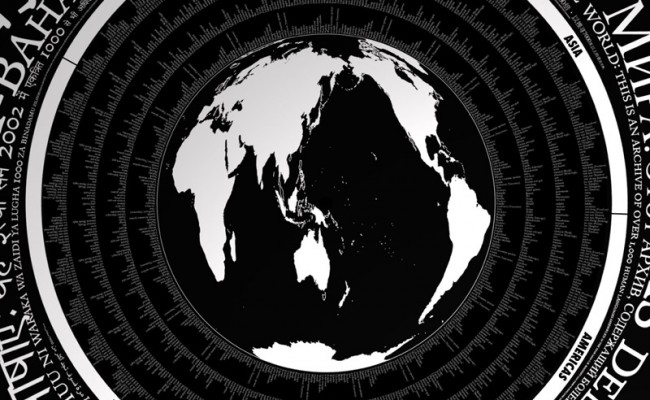Karl Marx once expressed the belief that the end of the capitalist era and the advent of communism would signal the end of human prehistory and the beginning of history proper. Filippo Tommaso Marinetti and the Futurists, for their part, wanted to destroy museums and libraries in order to usher in a progress contemptuous of tradition and all forms of previous knowledge. It’s hard to think of a way of thinking more alien to the present juncture: that of a long future so assuredly within our reach as to have little or no need for the past.
Five or six generations after Marx’s declaration, we measure the future in decades, running down an array of doomsday clocks. We speculate that the planet might become largely uninhabitable within the present century. We set symbolic deadlines for action. But the ninety-nine months that Prince Charles said were left in 2010 to take decisive action on climate change are down to a mere forty; in the meantime we’ve done nothing but burn ever greater quantities of carbon.
This isn’t paranoia or an existential malaise: we have solid reasons for fearing that humanity may be headed towards catastrophe. Yet it’s a strange, incongruous spectacle, resembling a crude allegorical fable. We have never lived longer or enjoyed a greater capacity for technical progress. In fact, our single greatest achievement may just be that we can measure the exact speed at which the end is approaching, and with it the shortening of our collective future.
If Marx was right, and if the catastrophe does come to pass, humanity will have ceased to exist before history has even begun. Yet there is arguably no task that we approach with as much urgency as documenting, cataloguing and storing that soon-to-be-meaningless past and the unfolding present. So-called life-loggers like Microsoft engineer Gordon Bell, who wear multiple sensors and recording devices on their persons at all times in order to capture and store every moment of their waking lives, are in this respect emblematic everymen, destined to spend their dying years contemplating a perfectly preserved yet functionally unrememberable past (for memory requires that some things – most things – be forgotten). So, too, we might reach a point where we have perfected the collective archive just as we run out of people to make sense of it and for whom it might make sense.
Yet still some of us dream of a long future.
Just before the turn of the millennium, the American writer and ecologist Stewart Brand suggested – in a book entitled The Clock of the Long Now – that we should take to writing the year using five digits instead of four. Thus the year 1999 would have to be written as 01999. It was a pointed quip to make at that time, just as the world was about to test whether the Y2K bug would make planes fall out of the sky and plunge the capitals of the industrialised world into darkness. Its intent – like the image of Earth from outer space that Brand had used in the Whole Earth Catalog – was to function as a thinking tool: the leading digit, which wouldn’t tick over for another 8000 years, might make people perceive a longer future and hopefully act accordingly, in an ecological sense.
I don’t know how effective that mental trick might be, but I’ve long been fascinated by one of the artefacts produced by Brand’s Long Now Foundation: the Rosetta Disk. Etched with the equivalent of over 13 000 pages of information in 1500 languages, the disk is designed to enable archaeologists and historians of the far future to decipher the scripts used by our civilisation. Being physically as opposed to digitally inscribed, the disk can be read without requiring hardware other than a microscope, while the outer layer – which explains what the disk is for – is visible to the naked eye.
More than the Rosetta Stone to which the disk’s name refers, this linguistic archive resembles an ark. And like an ark, it expresses the belief that there is a future – just not for us. Even the ten-thousand-year horizon of the ecologists is nothing, then, but a way of measuring time on somebody else’s scale, and our history goes back to being a prehistory. Except this time, unlike in the visions of Marx and of the Futurists, the new era to come is not for us to influence or shape. And the present, well, the present is to be treated exactly as we are: as a database or archive, always to be added to but never to be made sense of. A thing to be saved so that someone else some day might reopen it.
Reclaiming a future-oriented politics might also involve rethinking the way we remember the present.



